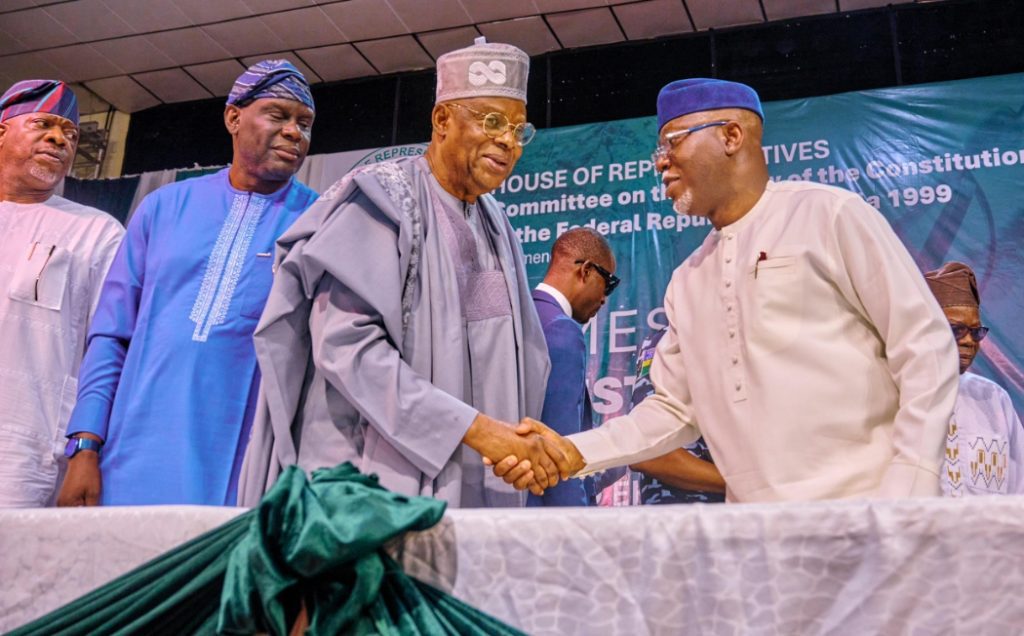By Josephine Oguntoyinbo & Adedotun Ajayi
The Governor of Ondo State, Dr Lucky Aiyedatiwa, has said that any meaningful constitutional amendment must reflect the values, aspirations, and socio-economic realities of the people, particularly through the adoption of true federalism and a restructured revenue-sharing formula.
He made this assertion during the South-West Centre B Public Hearing of the House of Representatives Committee on the Review of the 1999 Constitution (as amended), held on Friday, 18th July 2025, at the International Centre for Culture and Events (The Dome), Akure, the Ondo State capital.
While welcoming delegates and stakeholders from Ekiti, Osun, and across the South-West, Governor Aiyedatiwa commended President Bola Ahmed Tinubu for his commitment to democratic reforms and lauded the House Committee, led by Rt Hon Benjamin Okezie Kalu, for bringing the constitution review exercise closer to the people.
Describing the review as a “timely and laudable endeavour”, the governor emphasised the need to breathe new life into the Constitution so it can better respond to Nigeria’s evolving challenges. He highlighted key areas where Ondo State supports urgent constitutional amendments, including fiscal federalism, state policing, control of mineral resources, and recognition of Local Council Development Areas (LCDAs).
“Ondo State aligns with the progressive aspirations of the South-West in advocating for true federalism that reflects the socio-political, cultural, and economic realities of the federating units,” Aiyedatiwa said.
“States should have full control over their resources and remit about 40% to the Federal Government. The current revenue allocation is skewed in favour of the centre, and that must be corrected.”
The governor strongly advocated a review of the revenue-sharing formula, stating that states should receive no less than 50 per cent of revenue generated from the federation account.
On security, Dr Aiyedatiwa called for the establishment of state police, noting that the centralised policing system is no longer effective in tackling Nigeria’s complex internal security threats.
“The centralised police institution has tried its best but has become overwhelmed and underfunded,” he said.
“States, being closer to the people, better understand their local security challenges. The success of the Amotekun Corps in the South-West is a strong argument in favour of state police.”
He also proposed that control over natural resources, particularly minerals, should be removed from the Exclusive Legislative List and placed on the Concurrent or Residual Legislative List to enable states to fully harness their mineral wealth.
“Ondo State is blessed with mineral resources like limestone, granite, bitumen, kaolin, and marble,” the governor said.
“Yet, operators face bureaucratic bottlenecks and illegal mining thrives due to weak federal oversight. This must change.”
Aiyedatiwa further demanded that the 33 LCDAs created in Ondo State be recognised as full-fledged Local Government Areas in the First Schedule of the Constitution, just as is being proposed for similar structures in Lagos State.
While Ondo State is not opposed to the creation of new states, the governor firmly rejected any proposal that would alter the current territorial integrity of the state.
Furthermore, Governor Aiyedatiwa reaffirmed the state’s commitment to working with the National Assembly and other stakeholders to produce a Constitution that better reflects the collective vision for a stronger, fairer, and more inclusive Nigeria.
“Let us be guided by a commitment to democracy, true federalism, and social justice. This is our chance to shape the future through meaningful contributions and progressive reforms,” he added.
Meanwhile, the Nigeria Union of Journalists (NUJ) has urged the inclusion of constitutional safeguards for press freedom and the establishment of a media bailout fund to support struggling independent media outlets.
Speaking on behalf of the NUJ National President, Comrade Alhassan Yahya Abdullahi, the Ondo State NUJ Chairman, Prince Leke Adegbite, emphasised the critical role of the press in holding government accountable. He warned that threats to journalist safety and the financial struggles of media houses could weaken democracy.
The NUJ called for provisions to guarantee the safety of journalists, their equipment, and freedom from economic and political pressure. It also advocated a transparent, independently managed bailout fund to sustain the operations of private media organisations across the country.
“Independent media provide a platform for diverse opinions and enhance public discourse. A bailout fund will help preserve editorial independence and protect jobs,” Abdullahi stated.
In a broader context, the House of Representatives Committee received wide-ranging memoranda from key stakeholders at the public hearing.
Representatives of labour unions, professional bodies, religious groups, civil society organisations, traditional institutions, and women’s groups from Ondo, Ekiti, and Osun States presented proposals aimed at correcting longstanding imbalances and deepening democratic practice.
A common thread among the submissions was the call for true federalism and devolution of powers, with many groups describing Nigeria’s current centralised structure as unsustainable.
Ekiti State Governor, Mr Abiodun Oyebanji, represented by the Attorney General and Commissioner for Justice, Mr Dayo Apata, called for equal political representation for women and persons with disabilities, formal recognition of traditional rulers, and restrictions on the indiscriminate movement of herders and livestock across the country.
In his remarks, Osun State Governor, Senator Ademola Adeleke, represented by his Deputy, Mr Kola Adewusi, called for the reduction of the high cost of governance and political campaigns, warning that unregulated campaign expenses could lead to desperation and electoral malpractice.
Representing traditional rulers, the Olowo of Owo and Chairman of the Ondo State Council of Obas, Oba Gbadegesin Ogunoye III, advocated the constitutional recognition of monarchs and their inclusion in policymaking processes, noting that they remain the closest authorities to the grassroots.
Also speaking, the Chairperson of the Nigerian League of Women Voters, Mrs Titilayo Owolabi, submitted a petition with 33,000 signatures, demanding greater inclusion of women in governance and political participation.
Other stakeholders, including the Nigeria Union of Local Government Employees (NULGE), also submitted memoranda on areas of interest for amendment in the 1999 Constitution.

